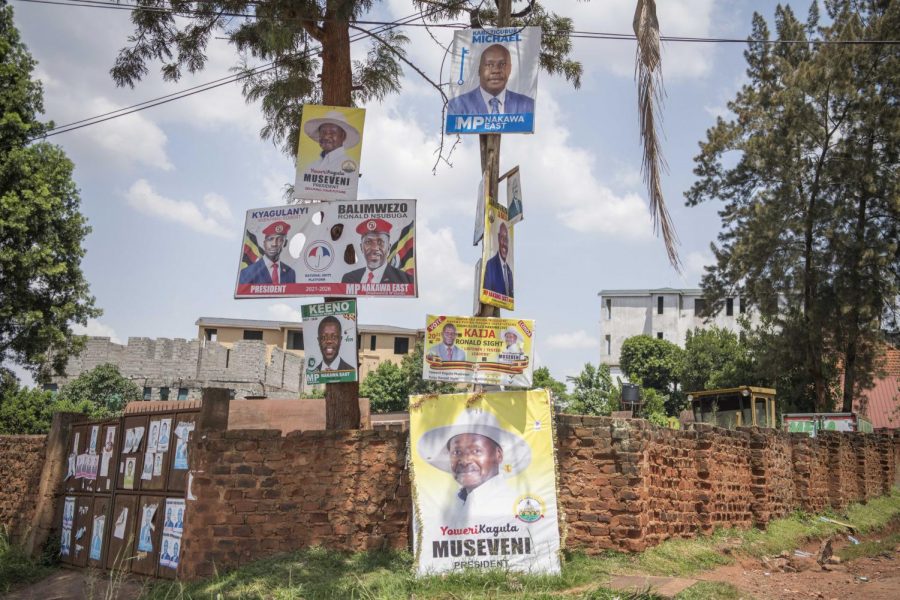News Analysis: Chaos unfolds in Ugandan election
WEEKS AFTER UGANDA’S JAN. 14 election, campaign posters still promote the candidates that ran for office. Ugandan President Yoweri Museveni has held his position in office for 34 years. He has faced with his first serious challenger, a 38-year-old rapper from the slums who goes by “Bobi Wine,” who is particularly popular among young people.
February 7, 2021
The United States is not the only country currently dealing with allegations of election fraud in a presidential election. Uganda’s long-serving president is faced with accusations of fraud and intimidation of his political opponents. A nationwide WiFi blackout was imposed by President Yoweri Museveni on Jan. 13 in the central African country of Uganda in preparation for the nation’s election on Jan. 14. WiFi and cellular data were inaccessible for five days. The blackout was put in place ostensibly to prevent widespread election misinformation but also served to prevent any communication regarding voter intimidation or proof of election tampering.
Yoweri Museveni, the current president of Uganda, is assumed to be about 76 years old, though Uganda had no birth records for their people until Museveni reinstated birth registration in 2000. He has been president of Uganda for 34 years since 1986. In 2005, presidential term limits were removed and in 2017, the removal of maximum presidential age limit of 75 was removed, which allowed for Museveni to be continually reelected.
For the first time in Museveni’s presidency, he has had a strong challenger for his place as president of Uganda. A 38 year old rapper and politician from the slums of Kampala, named Robert Kyagulani Ssnatanu or ‘Bobi Wine,’ has caused quite the uproar and attracted support particularly among the youth of Uganda. Wine has been repeatedly arrested throughout his election campaign.
This is not the first time Museveni has arrested a political opponent. Leading up to the 2006 election the opposition candidate was arrested for multiple months leading up to the election. In the 2005, 2011, and 2016 elections, observers noted an increased military presence on voting day; they cited it as a form of intimidation.
The official results of the Ugandan election this year were not much different from years previous. On Jan. 16, Museveni announced his win of 59% to Wine’s 35%. Wine, however, refused to concede and consequently was put under house arrest for 11 days. While under house arrest, he had a lawyer file on his behalf a complaint to the United Nations regarding his illegal confinement. Wine and his team are currently being tried in a military court, and as of Feb. 1, the court deferred their bail for another eight days.
Wine has tweeted evidence of a fraudulent election, showing documentation where Museveni claimed 100% of the votes at 348 polling stations and around 95-99% at many others. The Museveni documentation also claims that 100% of registered voters voted on election day, an unrealistic claim taking into consideration the fact that many voters on the rolls have died, were sick, traveled to vote, or just didn’t vote at all.
Wine has called out to his fellow Ugandans to hold Museveni and his government accountable and not let them claim an illegitimate victory. He also has called out to world powers such as the United States to pull foreign aid from Uganda as punishment and to hold Museveni accountable for his actions. The US is currently debating what actions to take.
Museveni has been rumored to be terminally ill with cancer and is 76 years old. Why is he still so fervently holding onto his presidency?
There are two arguments: either Museveni is a power-hungry dictator or he is too afraid to give up the country he has built back up from the ground. Maybe it’s a combination of both.
There is no denying the good he has done for Uganda. He has rebuilt the economy after former president Idi Amin destroyed it in the 1970s by exiling 70,000 people of Asian and European descent and killing between 80,000 to 300,000 Ugandans. He drove out the Lord’s Resistance Army in the 2000s who used children as slaves and child soldiers to wreak havoc on northern Uganda. Museveni has worked with outside NGOs to bring back the exiled child soldiers and reintegrate them into their communities. He has also welcomed refugees from the Democratic Republic of the Congo, Sudan and other countries with open arms. There is no questioning his love of Uganda and desire to protect the peace and prosperity within his country.
But will his refusal to give up his presidency undo all the good he has done? If he refuses to give it up what will happen to Uganda with the removal of aid and help from outside countries? Is he better off continuing to pretend he’s the rightful president or handing it off to a 38 year old rapper with a law degree? One thing seems clear: he won’t hand over his presidency until he finds someone he trusts.




